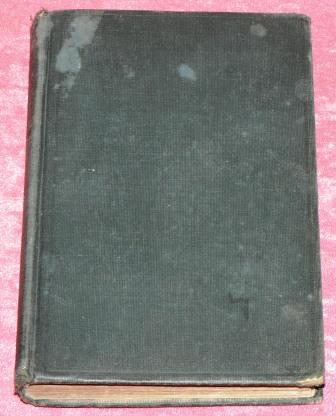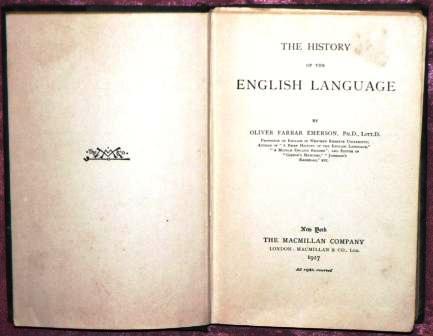История английского языка
THE HISTORY OF THE E N G L I S H L A N G U A G E
BY
OLIVER FARRAR EMERSON, PH.D., LITT.D.
PROFESSOR OF ENGLISH IN WESTERN RESERVE UNIVERSITY;
AUTHOR OF “A BRIEF HISTORY OF THE ENGLISH LANGUAGE”,
“A MIDDLE ENGLISH READER”; AND EDITOR OF
“GIBBON`S MEMOIRS”, “JOHNSON`S RASSELAS”, ETS.
New York
THE MACMILLAN COMPANY
LONDON: MACMILLAN & CO., LTD.
1927
All rights reserved
COPYRIGHT, 1894,
By MACMILLAN AND CO.
PRINTED IN THE UNITED STATES OF AMERICA BY
THE BERWICK & SMITH CO.
“THE STANDARD LANGUAGE AND THE DIALECTS”
THE OLD ENGLISH PERIOD
PREFACE
The following chapters are based on lectures given for several years past at Cornell University. These lectures were intended to embody some of the more recent investigations in English philology and serve as an introduction to the history of the English language. This will explain in brief the origin of the book now published. Some further words as to its plan may not be out of place.
It will be noted that the author has emphasized throughout the development of the native element in English. This has been done because many studies of the English language seem to give undue prominence to the foreign element, and to leave an incorrect impression as to what would have been the development of our mother tongue if there had been no such contact with foreign nations as has taken place in the history of the English people. Such an incorrect impression results mainly from a wrong conception of the Norman conquest and of its effect upon the English language. The Middle English period has therefore been treated with special fullness, in order to show the real relation of the conquest by the Normans to the language of the conquered people. In this part my indebtedness to the historians Freeman and Stubbs will be evident. At the same time the facts cited by those writers have been examined anew from the standpoint of the philologist, in order to correct misinterpretations to which the historian not trained in linguistic science is liable. Yet not only in connection with the Middle English period, but in the treatment of the vocabulary, the phonology, and the inflections, the same importance has been attached to English as one of the Teutonic languages, and one not so much modified by external influences as has been often supposed.
Another element in the history of English which has also received special attention is the phonology of the language, or the sounds and their relationships. No apology for this will be necessary to those who know the importance of the study of the spoken, that is the living, word as fundamental to all linguistic study. To other the author may say with the confidence of an English philologist in his preface to a recent book, the day of phonology as a fundamental adjunct to linguistic study must inevitably come. While the part dealing with phonology will be least attractive to many, and may be omitted altogether by some, the author was unwilling to attempt a history of English without emphasizing the importance of phonetics in explaining linguistic facts, the regularity of phonetic changes, and the relationships of words as shown by the relationships of the sounds composing them.
This book is designed for college classes and for teachers of English. The purpose was to make a hand book which should be neither too elaborate for college use nor too elementary for the scholar. For this reason a greater minuteness in detail was deemed inadvisable. Some will no doubt wish to supplement the book with additional lectures, and with more detailed explanation of many points. On the other hand some may prefer to use only the historian portions, with the chapters on the vocabulary and on inflections. It is hoped the book may be useful to both classes, serving as a basis for study, and stimulating if possible to more extended investigation of the philology of the English tongue.
My indebtedness to various books and studies will be readily perceived from the authors quoted or referred to in the foot-notes. The latter will also direct further study in connection with subjects mentioned in the text. In acknowledging suggestions and assistance from various friends, I desire to mention especially Professor Herbert Eveleth Greene of Johns Hopkins University, who has kindly read the book as it was passing through the press. My thanks are also due to Mr. William Strunk, Jr., and Mr. Wilbur C. Abbot, who have assisted in proof-reading.
O. F. E.
ITHACA, Sept. 1, 1894.
Educational materials: book, map and so on.
Для тех, кто заинтересовался этой книгой, ее стоимость - 200 USD.



















